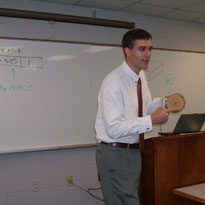Poka-Yoke
- Course:Poka-Yoke
- Course ID:POKAYOKE Duration:2 days Where: Your Office (7+ Persons)
- Download Course Description (PDF)
Available as a private, customized course for your group at your offices or ours and in some cases as a WebLive(TM) class.
Course Outline
Day 1: Poka-Yoke Philosophy, Approach, and Opportunities
- Poka-Yoke History and Philosophy. The Toyota Production System. Shideo Shingo. Mistake proofing. Design and process mistake proofing overview. Zero defects quality approaches. Inspection shortfalls and the need for mistake proofing. The disadvantages of customer defect discovery.
Case studies.
- Types of Mistakes. Mistake categories, including forgetfulness, misunderstanding, incorrect identification, lack of experience, willful mistakes due to ignoring rules or procedures, inadvertent errors, slovenliness, lack of standardization, surprises due to unexpected operation and other factors, and intentional mistakes.
Case study. Group exercise.
- Types of Inspections. Inspection methods, including sampling, 100%, and statistical process control. Operator versus inspector quality responsibilities. The three types of inspection, including judgment inspection, informative inspection, and source inspection. Inspection error types and frequency of occurrence. Personnel turnover issues.
Inspection exercise.
- Poka-Yoke Opportunity Selection. Using Pareto and other nonconformance data base sources for prioritizing Poka-Yoke opportunities. Sales, warranty, and customer feedback. Manufacturing feedback. Using simulations. Using DFMEA and PFMEA (Design and Process Failure Modes and Effects Analysis) for preventive action opportunities.
Client-specific group exercise.
Day 2: Poka-Yoke Device Design, Implementation, and Course Wrap-Up
- Identifying and Eliminating Error Sources. Viewing errors and defects as both inevitable and capable of being eliminated. Eliminating causes at the source. Detecting errors and defects as they are made. Detecting errors and defects either immediately or before they reach the next operation. Using next workstations as Poka-Yoke points. Controlling versus preventing or eliminating causes. 5-Why analysis.
Client-specific PFMEA and DFMEA exercises.
- Poka-Yoke Devices. Prevention versus detection philosophies. Correcting and preventing mistakes versus making mistakes obvious. Poka-Yoke approaches, including guide pins, appropriate design margins, optical magnification, colored tags, listboxes, spell checks, counters, asymmetric and symmetric designs, error checking logic, exact parts count approaches, blinking lights and alarms, limit and proximity switches, counters, and checklists. Using the highest principle possible, considering elimination, replacement, facilitation, detection, and mitigation.
Client-specific Poka-Yoke device design exercises.
- Poka-Yoke Device Implementation. Viewing the next workstation as the user. Continuous flow as a Poke-Yoke tool. Training approaches. Common implementation issues. Implementation risks and risk avoidance strategies. Post-implementation effectiveness evaluation.
Client-specific Poka-Yoke implementation exercises.
- Course Wrap-Up. Course review. Questions and answers. Plans for future Poka-Yoke actions. Course critique.
Course in a Nutshell
Poka-Yoke is a tool that will help you mistake-proof designs and processes, thereby preventing or greatly reducing product and process errors. The Poka-Yoke concept is based on principles developed by Shideo Shingo, the father of the Poka-Yoke approach and a key member of the Toyota Production System. Your organization can benefit greatly from this analysis tool.
This course utilizes real-life case studies to help you apply this toolkit effectively to your job. The course also incorporates case studies specific to your organization’s products and processes. Organizations identify key points for mistake-proofing their designs and processes as an integral part of this training experience.
The Eogogics Poka-Yoke program is an intense 2-day course that will teach your staff how to effectively implement the Poka-Yoke philosophy into existing and future products and processes.
Customize It!
Whatever the nature of your system and objective, whether failure prevention or cause determination, we will customize the course to meet your specific needs and concerns. Here are some of the ways in which we can tailor the course to help you get more out of it:
- Additional “workshop days” to allow the participants to work together to prepare Poka-Yoke devices specific to your organization. The workshop day can be scheduled a few weeks after the course to allow time for applying the technologies presented in class under an experienced Poka-Yoke practitioner’s guidance.
- Schedule post-class follow-up consultation for continuing in-house product and process Poka-Yoke implementation.
Learn How To
- Work together to design and implement Poka-Yoke devices.
- Proactively eliminate potential errors before they occur.
Aimed At
This course is aimed at engineers, project engineers, design engineers, process engineers, program managers, and others responsible for identifying and preventing defects.
Prerequisites
While there are no formal prerequisites, the course assumes a design, process, industrial, manufacturing, or engineering background.
- “Great job! Course taught very good practices that all design engineers should follow. Vast subject area, not just assembly techniques. Instructor field experienced, not just an intellectual, very personable. Course book not too wordy, liked pictures/illustrations.” – Greg Klein, Manager Mechanical Engineering, Zebra Technologies
- “Good, useful info; appropriate to our business. Liked the instructor’s personal stories of various problems he has encountered and their solutions. Course book is good, clear and concise.” – Tom Zwier, Mechanical Engineer, Zebra Technologies
- “Excellent presenter, very knowledgeable, keeps interest. Examples and case studies send messages of importance regarding Poka-Yoke practices. Participant handbook very thorough.” – Manager, Fortune 500 Equipment Maker

